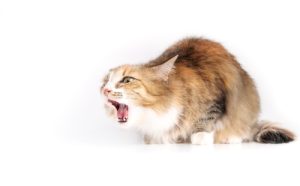Reverse sneezing is less common in cats compared to dogs. When it occurs it can be alarming to witness, but it’s usually nothing to worry about. It can easily be mistaken for a sneeze, cough or gagging episode.
Reverse sneezing is caused by a spasm in your cat’s throat that resolves by itself in around 30 seconds or less. If it becomes frequent or worsens, take a video recording of the event and contact a vet.

Overview
What is reverse sneezing in cats?
- Reverse sneezing is when a cat rapidly sucks air through their nose causing loud snorting, honking, or gagging sounds.
- It differs from a traditional sneeze where air is forced out through the nose.
- Reverse sneezing is an involuntary respiratory reflex caused by a spasm in the throat.
- This spasm can be caused by irritants such as:
- Dust
- Pollens
- Smoke
- Household products (fragrances, cleaning supplies)
- Foreign objects stuck in the throat
- Masses in the throat
- Food or drink
- Mites
- This is not painful or harmful to your cat and does not lead to significant or lasting respiratory distress.
- Typically lasts about 30 seconds.
Symptoms
What are the signs of reverse sneezing?
You might notice:
- Rapid and powerful inhalations causing snorting, honking, and gagging sounds
- With neck stretched out
These episodes should be differentiated from more serious coughs or choking.
If the symptoms are persistent or worsening contact your vets. It’s important to rule out other conditions such as respiratory infection, collapsing trachea, nasal tumours or polyps, foreign bodies.
Risk
Are some cats more at risk of reverse sneezing than others?
There is no age or breed predisposition.
Any cat can experience reverse sneezing. Although it is more often seen in cases of reaction to environmental irritants such as smoke, dust, air fresheners or cleaning products.
Diagnosis
How is reverse sneezing diagnosed in cats?
No tests are typically needed to confirm this diagnosis.
It’s very unlikely that your cat will reverse sneeze in a consult, so try to video record an episode before your vet appointment.
Reverse sneezing is diagnosed by:
- Talking through your cat’s recent events.
- When possible, watching a video of a past episode.
To rule out other conditions, your vet may need to do:
- Radiographs (x-rays)
- Rhinoscopy (scope that goes inside your cat’s nose and throat)
- Blood test
- Urine test
- CT scan
Vet treatment
How do vets treat reverse sneezing in cats?
Most cases of reverse sneezing require no medical treatment.
If an underlying condition is identified, treatment may include:
- Antiparasitic medications for mites
- Antihistamines and/or steroids for allergies
- Surgery to remove foreign object or mass
Home treatment
What can you do at home to help your cat with reverse sneezing?
- Stay calm. It usually only lasts 30 seconds.
- Keep your cat calm by speaking to them.
- Gently massage their throat.
- Sometimes covering one or both nostrils forces them to swallow and gets rid of the irritation.
- To decrease potential triggers, avoid certain fragrances, cleaning agents and smoking at home.
Prevention
How can you prevent reverse sneezing in cats?
Reverse sneezing is less commonly seen in cats than in dogs.
When it happens, it’s very difficult to prevent it.
If there are environmental triggers you can remove, do so.
Treating any underlying problems can also prevent the recurrence of reverse sneezing.
When to worry
When you should worry about your cat reverse sneezing
Contact your local vet practice if your cat shows any of the following signs:
- Reverse sneezing episodes worsen and become more frequent
- Collapse
- Being very tired
- Gums or tongue become blue or grey
- Struggling to breathe even after the episode of reverse sneezing
- Open mouth breathing
- Nasal discharge
- Bloody discharge
- Not eating or drinking
Joii can help:
- Differentiating reverse sneezing from coughing, sneezing or gagging
- If reverse sneezing occasionally








